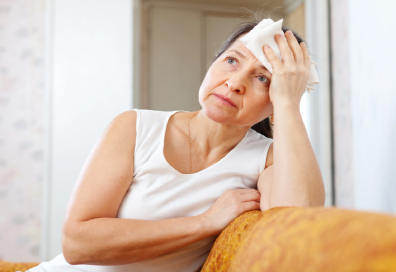
How Castor Oil Packs Help Support Perimenopause
Medically reviewed by: Victoria Williams R.H.N.
Est. reading time: 16 minutes
The choppy waters of perimenopause is a journey that women must navigate, and it’s a chapter in life that brings with it a cascade of emotional challenges. As the body undergoes subtle, yet profound changes, the emotional aspects can be just as dynamic.
From unexpected mood swings to heightened sensitivity, perimenopause presents a unique set of trials that can leave women grappling with a roller coaster of feelings.
In this exploration of perimenopause, we’ll explore the emotional and physical struggles that accompany this transitional phase of life.
But before we begin, let’s first understand the fundamental question: What is perimenopause?
What is perimenopause?
As women we often find ourselves on a journey as unique as a fingerprint- the transition into perimenopause. It’s a phase of life that’s rarely discussed openly, yet its impact can be profound and transformative.
If you’re wondering what perimenopause is, and how it might be influencing your life, you’re not alone.
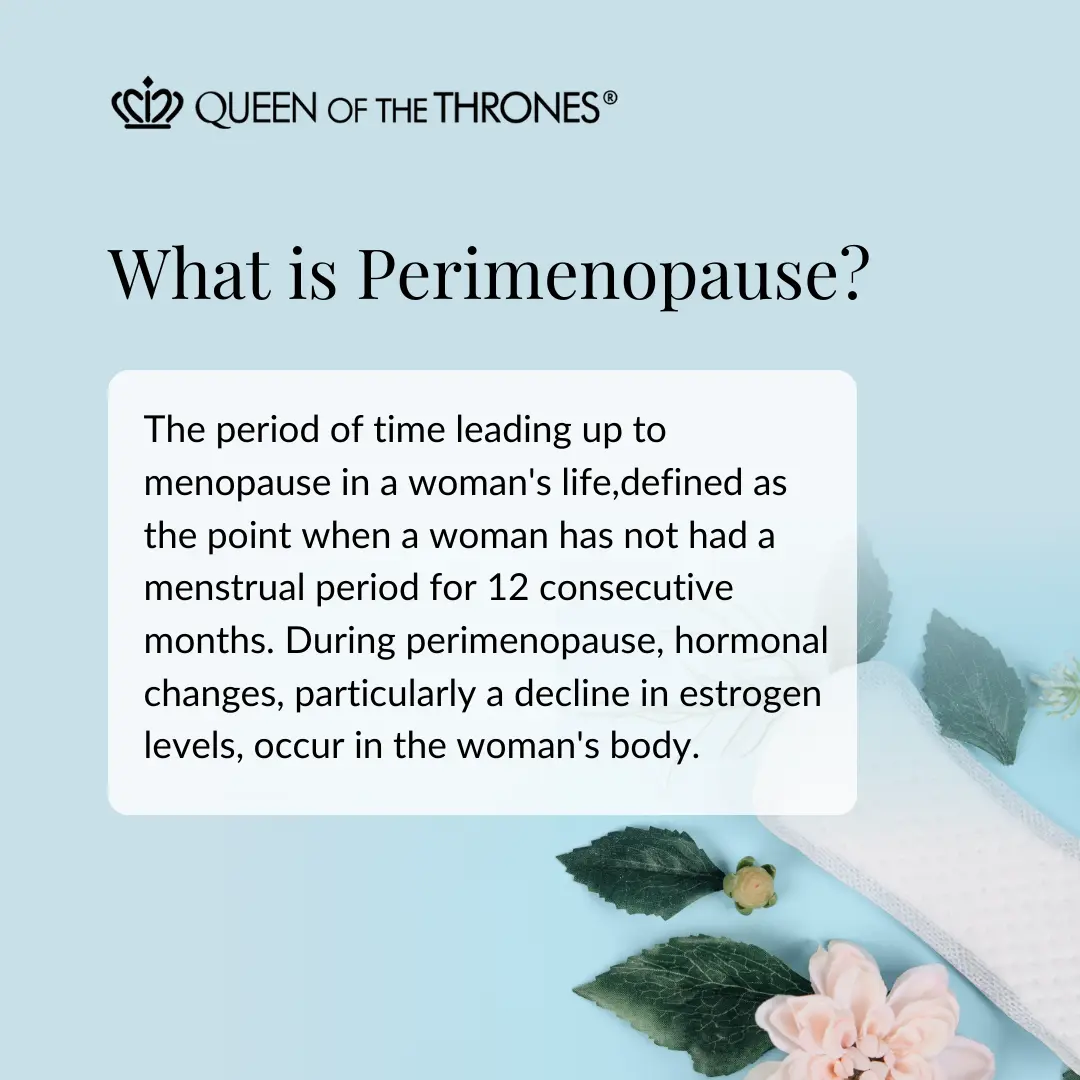
During perimenopause, hormonal fluctuations become more pronounced, leading to a variety of physical and emotional changes.
So, how can you make sense of these changes? Imagine your body as a finely tuned orchestra, and hormones as the musicians playing in harmony. As you enter perimenopause, this symphony takes an unexpected turn. Estrogen levels fluctuate, causing irregular menstrual cycles, mood swings, and even unexpected hot flashes.
It’s a hormonal roller coaster that can catch you off guard, making you wonder, “Is this normal?”
The biggest challenge with perimenopause is that it is often a silent struggle. Many women don’t openly discuss their experiences, leading others to feel isolated in their journey.
It’s important to recognize that perimenopause is a shared experience, and sharing our stories can break down the walls of silence surrounding this transitional phase.
Perimenopause comes in 2 stages, early stage and late stage, keep reading to learn more!
Stages of perimenopause
In the second stage, known as late transition, the time between periods becomes longer, lasting at least 60 days, until the final menstrual period occurs.2
The early menopausal transition is when there’s a consistent difference of 7 days or more in the length of menstrual cycles, or if one or more cycles are skipped. This inconsistency repeats within the next 10 cycles. As this irregularity continues, it leads to longer periods without menstruation.
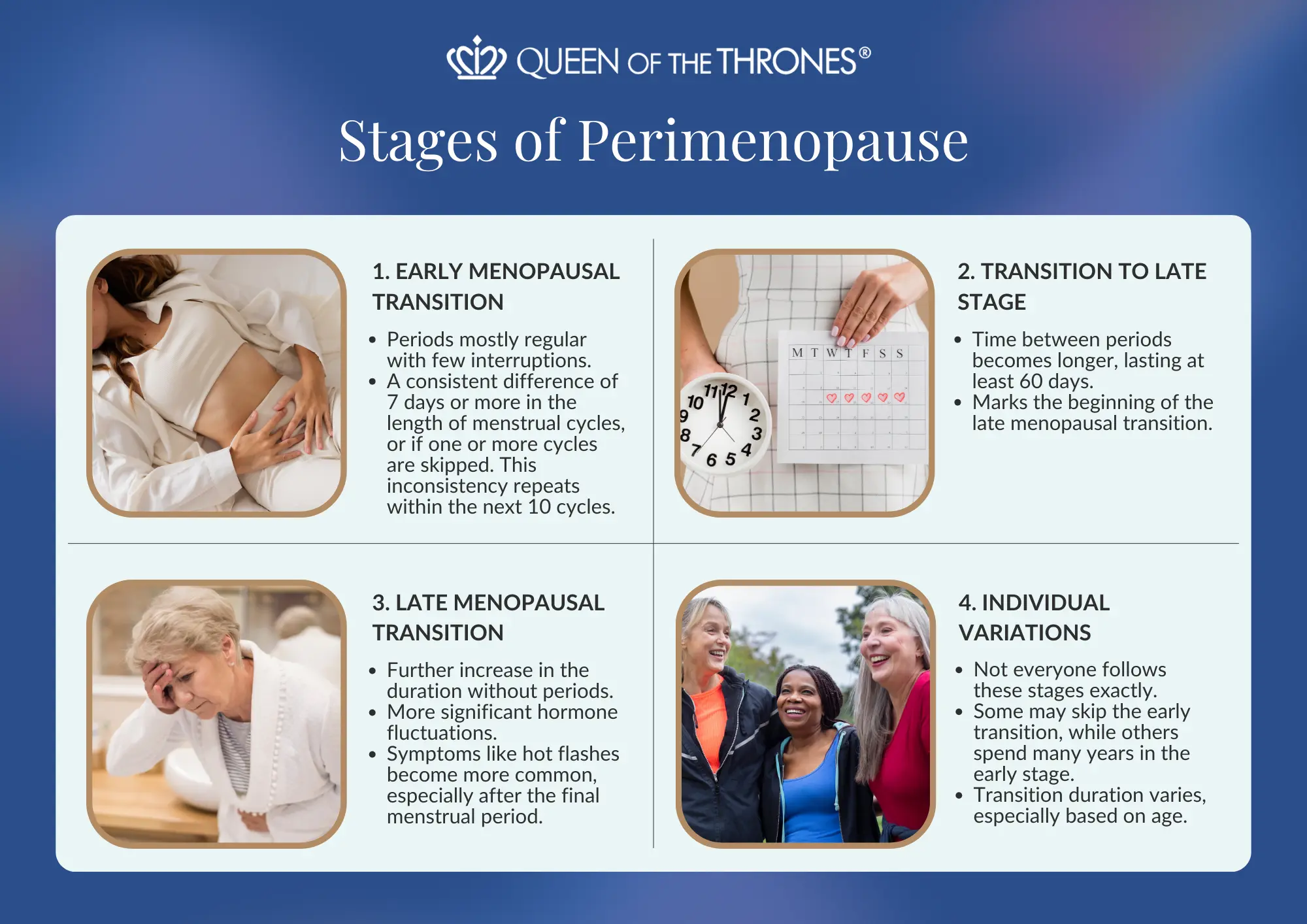
In the late stage, there’s a further increase in the duration without periods and more significant hormone fluctuations. This stage is more likely to bring about symptoms like hot flashes, although they are most common after the final menstrual period.
It’s important to note that not everyone follows these stages exactly. Some women, especially those transitioning later in life, might skip the early transition, while others, particularly those transitioning earlier, may spend many years in the early stage.3
So, what types of symptoms are present when experiencing this phase of life? Let’s explore!
Perimenopause symptoms
Let’s face it, if perimenopause were a playlist, it would be as diverse and unpredictable as shuffle mode on your favorite music app.
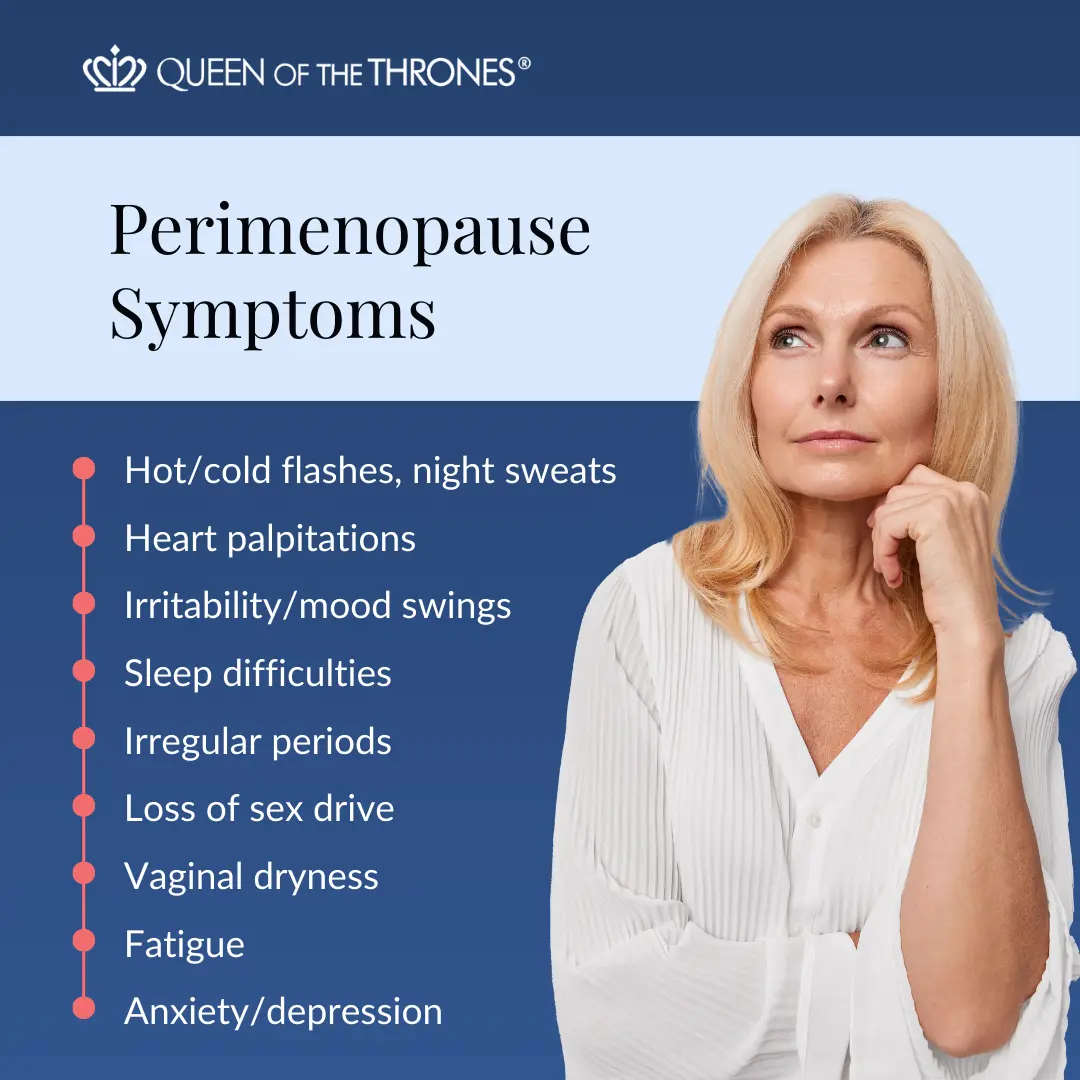
As women begin this phase, they often find themselves tuning into a symphony of symptoms that can range from subtle background noise to full-blown crescendos.
Let’s take a dive into the key symptoms that make up this unique playlist, shall we?
Perimenopause weight gain
Perimenopause is a time when women are more likely to gain weight. This happens because estrogen levels drop as the ovaries work less. Also, changes in hormones, getting older, less physical activity, and eating habits can add up to more body fat. Emotional eating during times of stress can play a role too.4
You see, it’s not just about the numbers; it’s about the internal emotions, insecurities, and the uncharted territory of a changing body. Can you relate?
Imagine stepping onto the scale and feeling like you’re in a guessing game. One day it’s up, and the next it is down, leaving you to wonder if your body is following its own playlist.
The shift in hormones that perimenopause brings, causes a hormonal dance that can influence your weight in ways that seem beyond your control.
As you zip up your favorite pair of jeans and notice a snugger fit, an internal dialogue begins, causing you to question your eating habits, exercise routine, and even your self-worth…
This transformation can feel like you’re learning a new dance to an unfamiliar beat, agreed?
But what about weight loss as a symptom? Let’s take a look at the other side of this transitional stage.
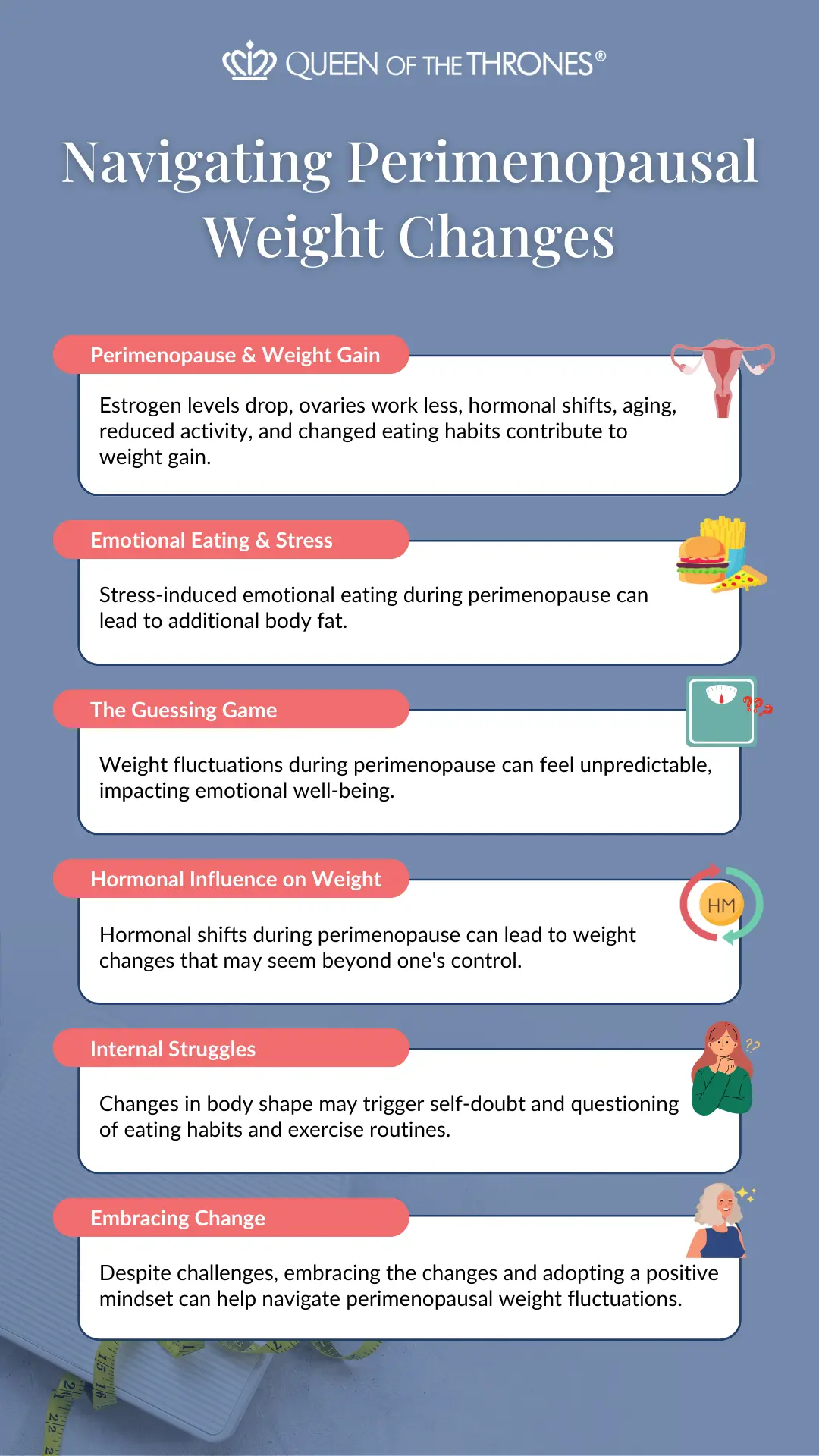
Perimenopause weight loss
On the other side of the tracks of perimenopause is weight loss, though less common, it is another silent struggle that plays out on the scale before you.
Picture stepping onto the scale, and instead of the expected stability you’ve known most of your life, you’re met with something unexpected; weight loss. While this might seem like an enjoyable side-effect to some, these numbers echo a change that might be as surprising as it is perplexing.
How or why do these weight fluctuations take place? Well, perimenopause brings hormonal shifts that can directly impact the number you see on the scale. And as these numbers dip, another internal dialogue takes hold…
In one instance you may be elated that you can now fit into those old clothes you used to, but those feelings also mix with questions about the unintentional weight loss, leading you to wonder about your health, and whether this weight change carries an unspoken worry about what might be happening within your body.
Plus, just as weight gain prompts a reevaluation of how you see yourself, weight loss can lead to new confusion when it comes to your body image. Perhaps the curves you were accustomed to begin to soften, and the silhouette in the mirror takes on a different contour… It’s a transformation that challenges the idea you may have already had of beauty and self-worth, agreed?
Navigating this unknown territory requires a delicate balance between embracing the changes, and understanding the factors at play, making this a great time to take a step back and focus on understanding your body’s needs, and nourishing it with self-care, like a Pelvis & Hips Castor Oil Pack to help support your hormone balance, and more.
Perimenopause and fatigue
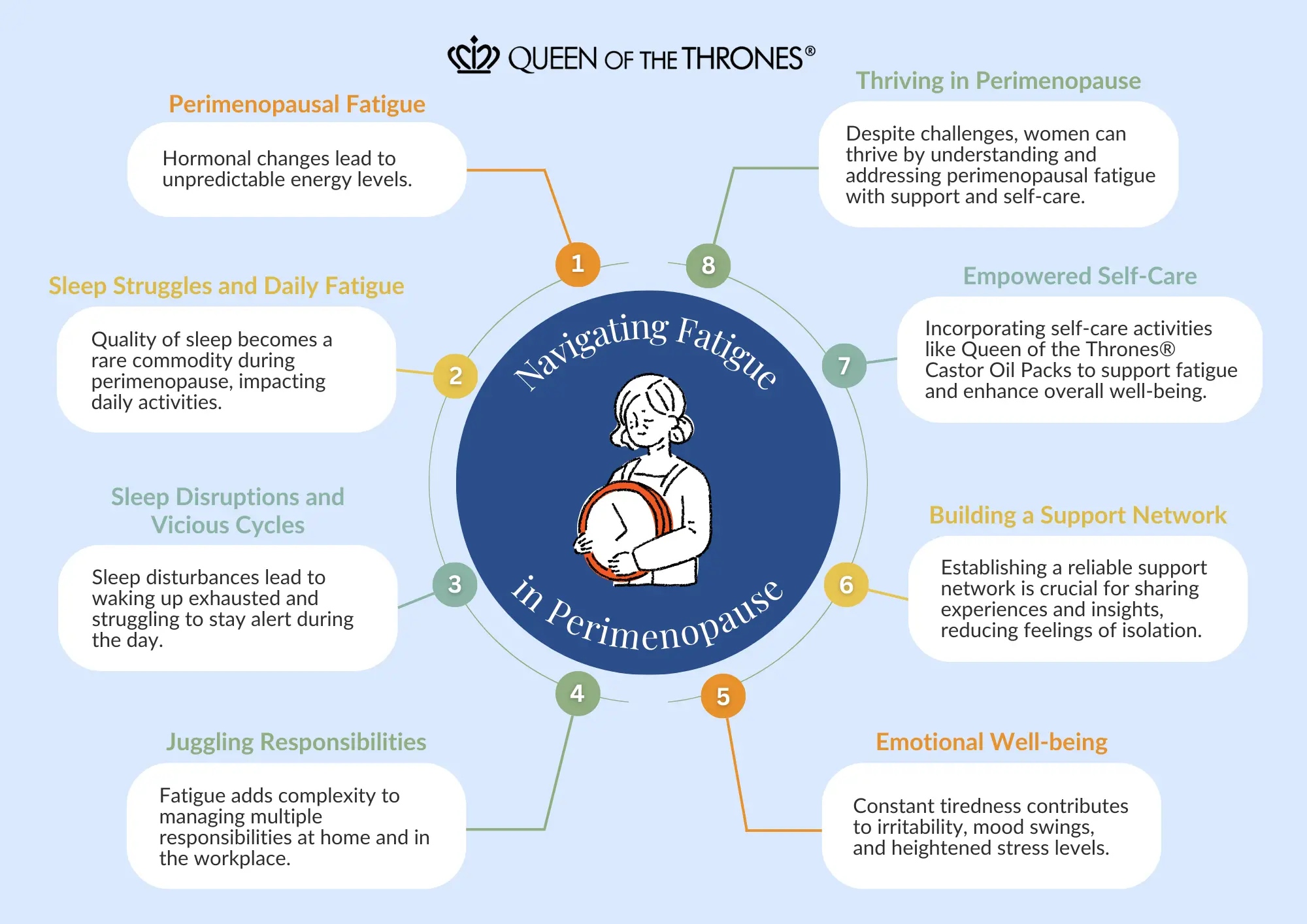
Because perimenopause introduces a rollercoaster of hormonal fluctuations, women are often at the mercy of unpredictable energy levels.
One day you might wake up feeling refreshed and ready to tackle the day, only to find yourself completely drained and fatigued the next… is this you?
The inconsistency can make planning and managing daily activities and tasks daunting, making quality of sleep a rare, but essential commodity during perimenopause.
Hot flashes, night sweats, and hormonal imbalances can disrupt once restful nights, turning them into a vicious cycle of sleep deprivation. The consequence? Waking up feeling exhausted and struggling to stay alert throughout the day.
And because women often find themselves juggling multiple responsibilities- career, family, and personal well-being, fatigue can make this delicate balance even more demanding, both at home and in the workplace.
Plus, exhaustion doesn’t just manifest physically; it takes a toll on emotional well-being.
Feeling constantly tired can contribute to irritability, mood swings, and a heightened sense of stress. This is why establishing a reliable support network, whether through friends, family, or online communities is essential, helping you to share experiences, and insights to help you feel less alone during these difficult times.
Sore breasts and perimenopause
Hormones play a central role in breast tenderness. Fluctuations in estrogen and progesterone levels can often lead to increased breast sensitivity6. As these hormones engage in a delicate dance, the breasts respond with tenderness, a physical manifestation of the hormonal changes at play.
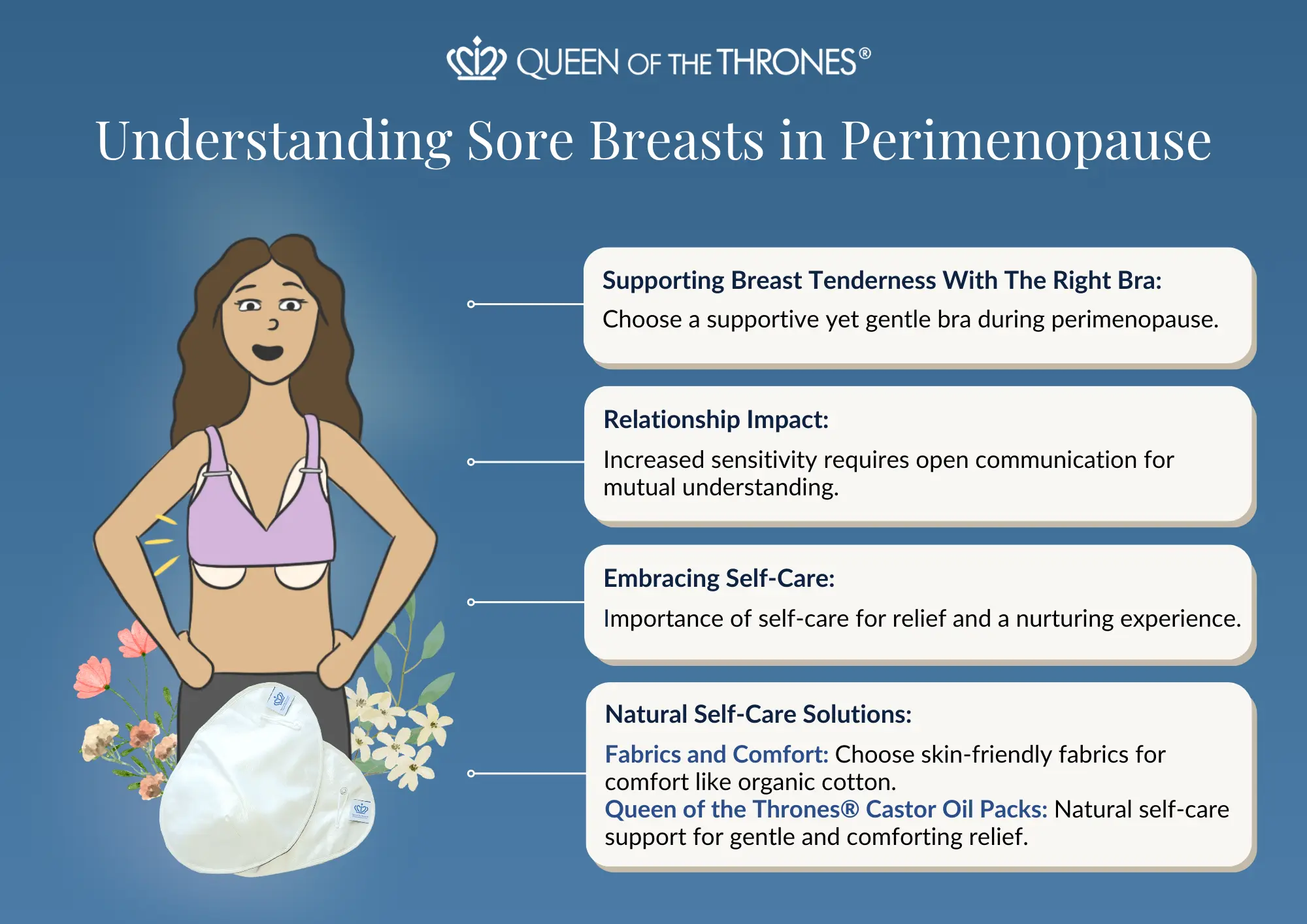
How can you help support breast tenderness during perimenopause? Finding the right bra is a great starting point, ensuring comfort and support during this period. The once beloved underwire bra may begin to feel like an instrument of torture, as increased sensitivity demands a gentler touch.
But breast tenderness can extend beyond the physical, influencing intimate moments when it comes to relationships. This increased physical sensitivity may reshape how women experience touch and intimacy, requiring open communication with partners to ensure mutual understanding and comfort during these times of change.
Which brings us to the importance of embracing self-care. Warm compresses, gentle massages, and choosing fabrics that are kind to sensitive skin can help offer relief. Plus, when you incorporate these self-care practices into your daily life, you create a nurturing experience in the fight against discomfort.
Looking for a great place to start for natural self-care for your breasts? The Queen of the Thrones® Castor Oil Packs for Breasts are here to bring you gentle, comforting support!
Insomnia and perimenopause
Do you find yourself tossing and turning at night, unable to escape the clutches of insomnia? If so, you’re not alone. Many women in their forties and fifties experience a unique combination of sleep disturbances and hormonal changes known as perimenopause.7
As the body transitions into perimenopause, hormonal fluctuations can wreak havoc on your sleep patterns. Night sweats, hot flashes and mood swings become unwelcome companions, leaving you yearning for a peaceful night’s sleep. Can you relate?
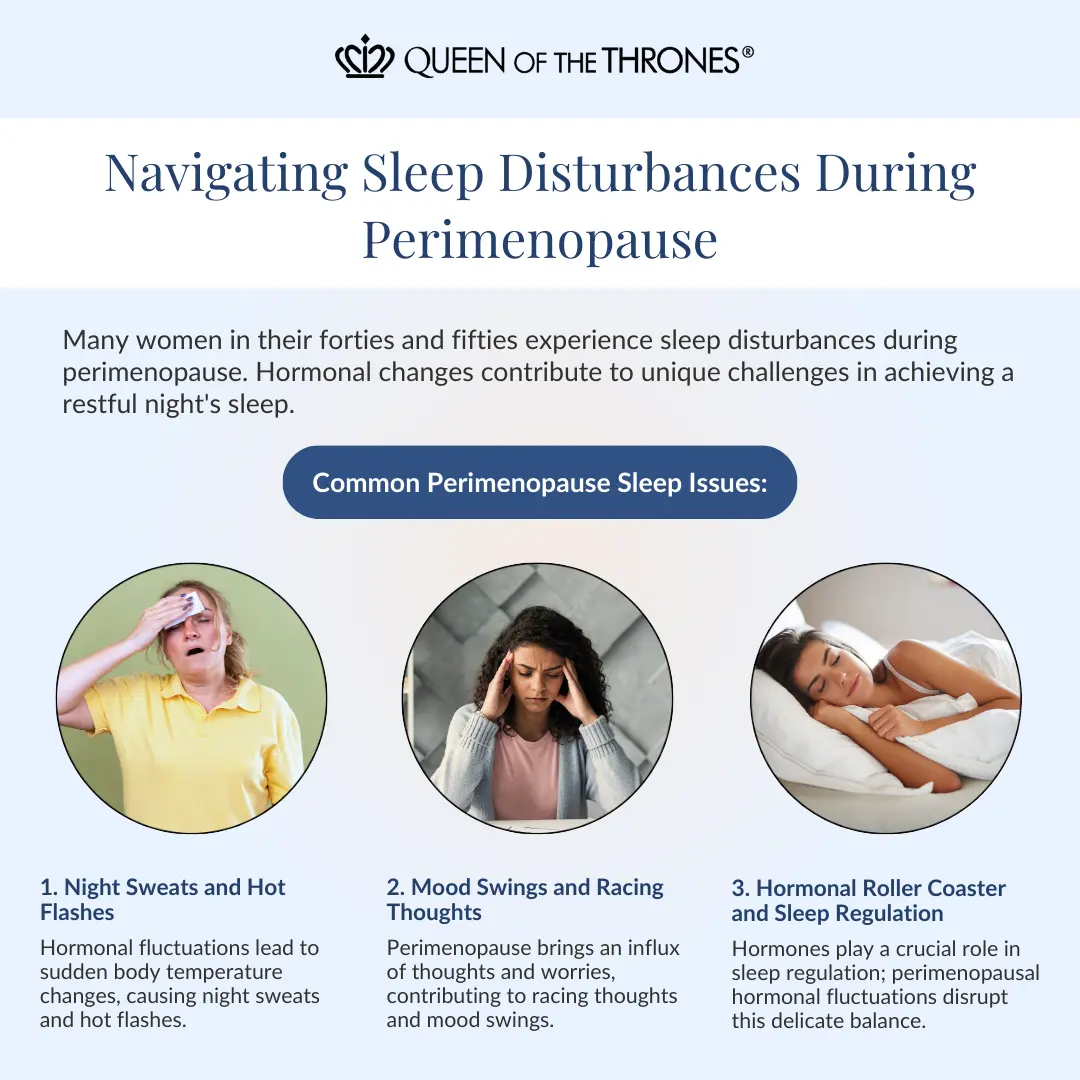
Ever lie awake at night with your mind racing like a never-ending marathon? Perimenopause often brings with it an influx of thoughts and worries that can make falling asleep feel like an impossible task.
Hormones play a pivotal role in regulating sleep, and the hormonal rollercoaster of perimenopause can throw this delicate balance into disarray.
So, how do you navigate those sleepless nights and insomnia? Well, self-care of course! But not just any self-care, we’re talking all natural, simple self-care that you can do to help support all these changes without worry.
Consider adding a Castor Oil Eye Compress to your self-care routine. Castor Oil is known for its anti-inflammatory properties, making this soothing, soft compress a comforting touch in helping to ease eye strain, and help support deeper relaxation.
The best part? You can help naturally enhance your sleep hormone melatonin!8
Perimenopause and night sweats/hot flashes
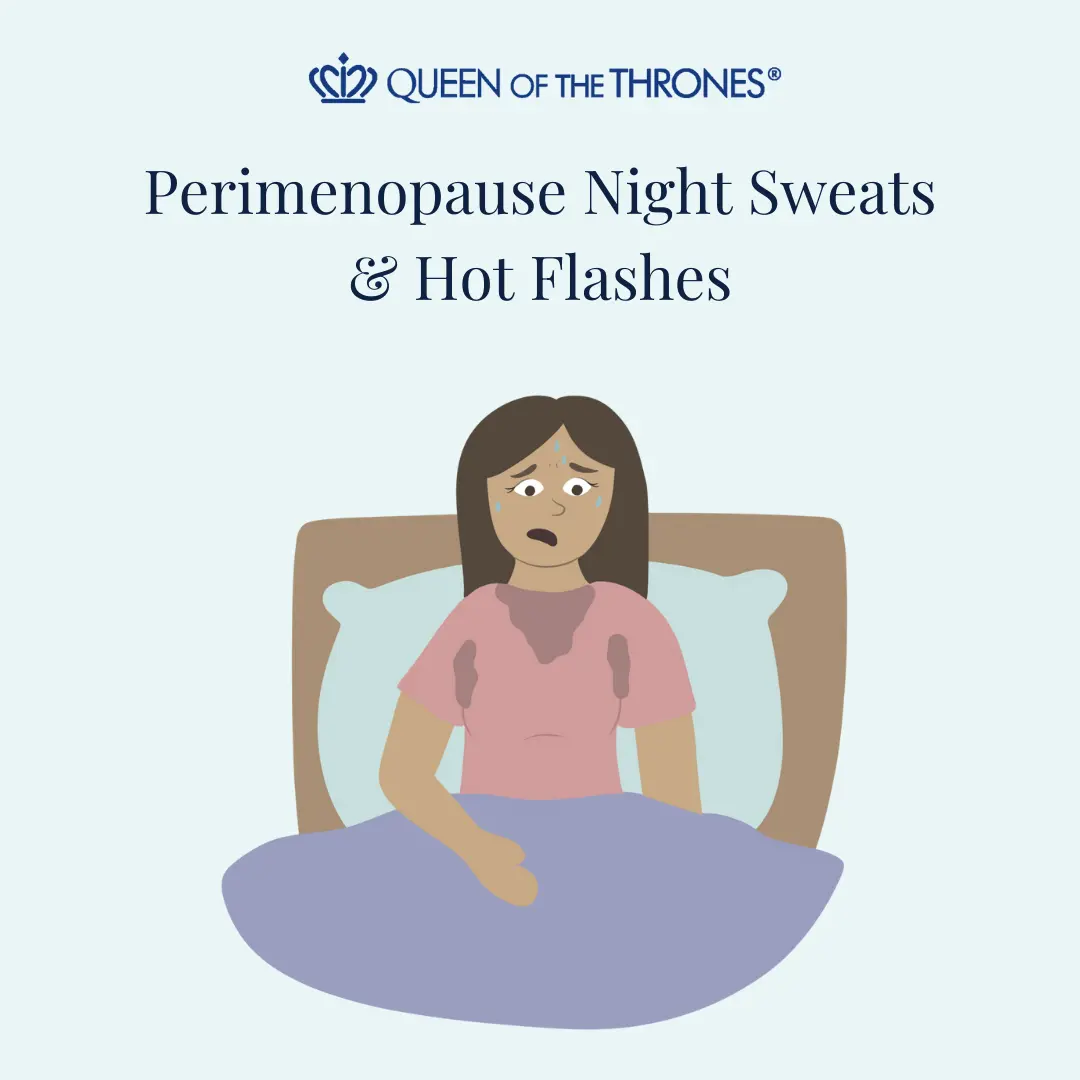
Night sweats, characterized by excessive sweating during sleep, can turn your cozy haven into a battleground of damp sheets and discomfort. Are you familiar with this unexpected and unpleasant midnight heat wave?
Hot flashes can strike at any moment- day or night. The sensation of intense heat spreading across your body, accompanied by flushed skin and a rapid heartbeat, can be disruptive and confusing, seeming to have a mind of its own…
The culprit behind these uncomfortable sensations? You guessed it- hormones. Fluctuations in estrogen levels, which are characteristic of perimenopause, can trigger the body’s internal thermostat to go haywire.
So how can you begin to make sense of these changes and find support? By adopting lifestyle adjustments and embracing supportive strategies, you can turn down the temperature, so to speak, and help work towards reclaiming more peaceful nights.
In the meantime, try a natural approach with the Hormone Balance and Detox Kit, your go-to for hormone balance, and gentle support with the natural goodness of Castor Oil!
Perimenopause and vaginal dryness
As we continue our exploration of perimenopause, another often unspoken aspect comes into focus: vaginal dryness.
Have you noticed changes in your intimate wellness that has left you seeking answers and solutions? You’re not alone.
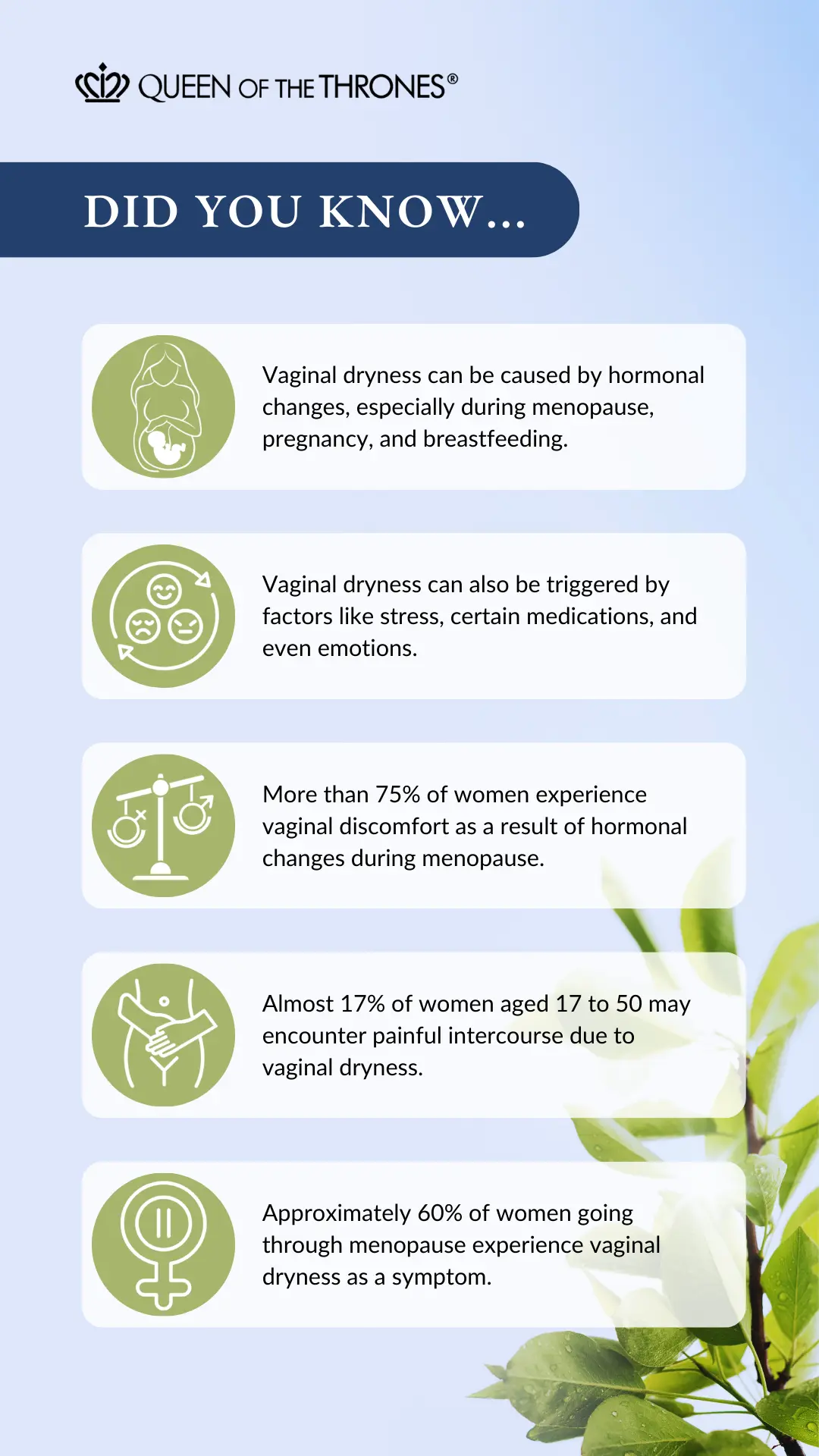
One of the less discussed but significant challenges during perimenopause is the onset of vaginal dryness. Changes in hormone levels, particularly a decline in estrogen, can lead to a decrease in natural lubrication, making intimate moments uncomfortable or even painful.
Estrogen, a hormone vital for maintaining the health of vaginal tissues, takes a noticeable dip during perimenopause, often resulting in changes to the vaginal lining. This can often impact moisture and elasticity.
Have you found it challenging to discuss these experiences openly?
Exploring natural support becomes essential for many women seeking comfort and relief. Thankfully, Castor Oil has been gaining more attention when it comes to supporting vaginal dryness, naturally.
Castor Oil, derived from the castor bean plant, has a rich history, containing anti-inflammatory and moisturizing properties10 that make it a helpful tool in the fight against vaginal dryness.
But how can Castor Oil support vaginal dryness?
Castor Oil’s natural emollient properties may provide a soothing touch. Applying a small amount of Castor Oil to the external vaginal area may help contribute to enhanced moisture and comfort. Sounds good, agreed?
Castor Oil Packs for perimenopause
In the midst of perimenopause, finding a comforting companion on this transformative stage of life becomes invaluable.
This is where Castor Oil Packs come in- a soothing practice that offers support for your wellness, helping to build a moment of self-care tailored to the unique challenges of perimenopause.
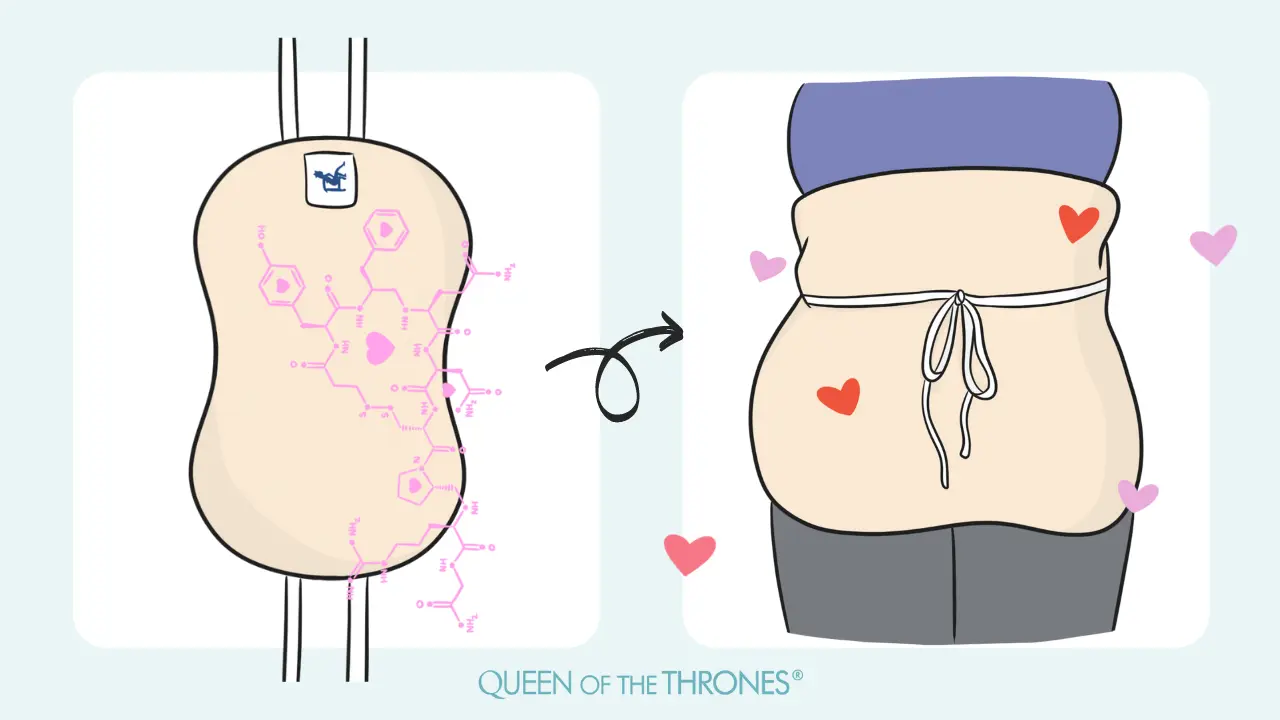
Castor Oil boasts anti-inflammatory properties11 believed to enhance relaxation, making it an ideal candidate for those seeking a holistic approach to perimenopausal support.
Have you ever wondered about the magic hidden in this golden elixir?
Creating your personal haven of tranquility involves a simple, yet profound practice- the Castor Oil Pack. This self-care routine is similar to wrapping yourself in a cozy blanket. Sounds relaxing, right?
Now, you might be asking, “Can’t I use any regular fabric”?
Well, here’s the catch: the ideal material for Castor Oil Packs is organic cotton or wool.
Nowadays, most clothing is made from synthetic fibers and treated with chemicals like bleach and flame retardants, which can disrupt hormones. Since Castor Oil is an excellent carrier oil that deeply absorbs, it’s crucial to use it only with organic materials against the skin.
That’s precisely why Queen of the Thrones® Castor Oil Packs were crafted by a naturopathic doctor, featuring premium organic cotton.
This ensures not only quality and convenience, but also provides maximum benefits for your wellness.
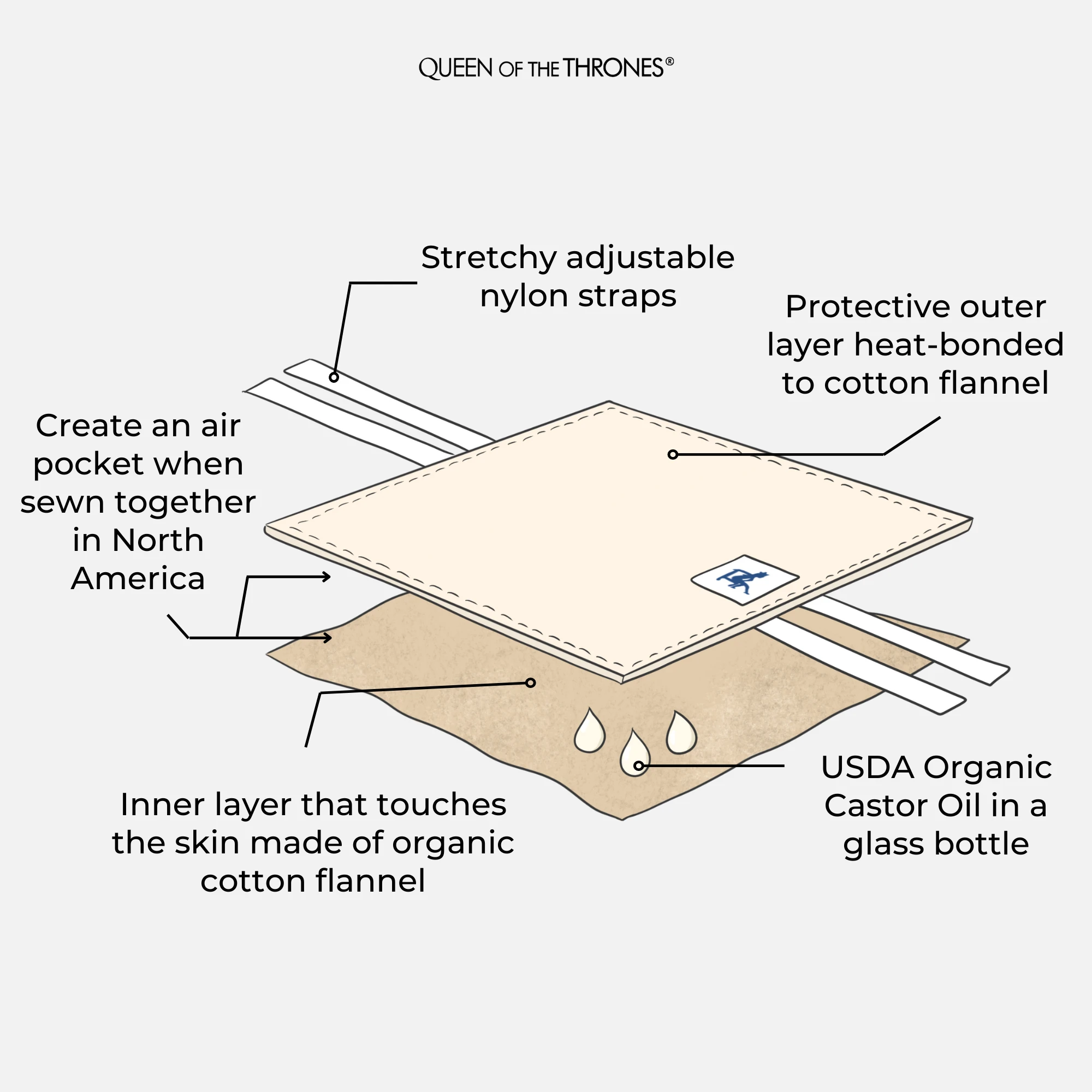
Why choose Castor Oil Packs for your self-care?
Stress and relaxation support:
- Gentle compression supports oxytocin, which may help balance cortisol and move your body into a relaxed state.12
- The cotton compress with the Castor Oil helps to stimulate pleasure centers, potentially supporting dopamine for a feel-good effect.13
Inflammation and detox support:
- Ricinoleic acid in Castor Oil has anti-inflammatory and pain-relieving properties.14
Colon cleansing and lymphatic drainage support:
- May support gentle colon cleansing, aiding constipation and bowel movements.15-16
- Gentle compression of the pack is thought to act as a pump, supporting lymphatic drainage, especially in the liver area.17
Sleep and hormone balance:
- A nightly routine enhances comfort for a restful sleep similar to a weighted blanket.18
- May support hormone balance through liver detox, lymphatic drainage, and colon cleansing.
Microbiome and digestive support:
- Castor Oil may help break down biofilm, potentially benefiting the microbiome19 and combating Candida via nitric oxide promotion.20
- Placing the pack over the liver and abdomen during discomfort helps support calm, potentially balancing inflammation, and supporting good flow within the body.
Enhanced absorption:
- May support the absorption of healthy food, supplements, and treatments, aiding digestion and overall well-being.
Sounds amazing, agreed? Get started with the Liver Castor Oil Pack for your wellness!
In closing…
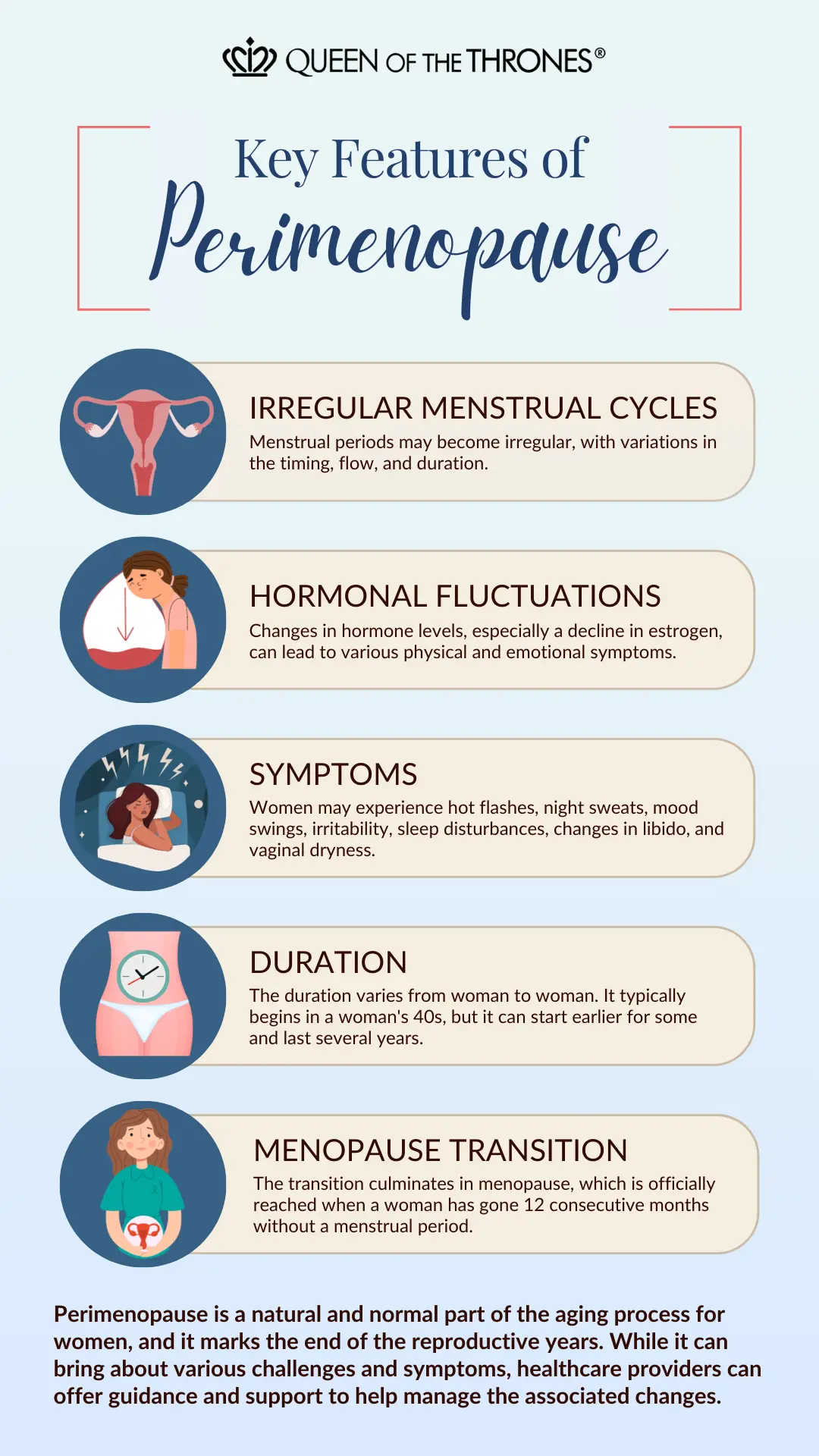
So, my friend, in the midst of perimenopause, where hormonal shifts shape both the physical and emotional challenges faced by women all over the world, it’s crucial to make time for self-care.
As you navigate the complexities, remember to embrace the importance of looking after yourself.
Whether it’s finding comfort in practices like Castor Oil Packs, or nourishing your body with nutritious foods- each element contributes to your personal self-care routine.
Make your well-being a priority, and acknowledge the challenges and changes with kindness. By focusing on self-care, you not only navigate the hurdles of perimenopause with resilience, but also lay the foundation for your well-being.
Are you a practitioner, health coach or wellness influencer? If you’re interested in recommending our easy-to-use tools and practically applying them in your health and wellness professional practice, in clinic, or online with the people you serve, you can join now!
Click here for references
- Tarlatzis BC, Zepiridis L. Perimenopausal conception. Ann N Y Acad Sci. 2003 Nov;997:93-104. doi: 10.1196/annals.1290.011. PMID: 14644814.
- McCarthy M, Raval AP. The peri-menopause in a woman’s life: a systemic inflammatory phase that enables later neurodegenerative disease. J Neuroinflammation. 2020 Oct 23;17(1):317. doi: 10.1186/s12974-020-01998-9. PMID: 33097048; PMCID: PMC7585188.
- Delamater L, Santoro N. Management of the Perimenopause. Clin Obstet Gynecol. 2018 Sep;61(3):419-432. doi: 10.1097/GRF.0000000000000389. PMID: 29952797; PMCID: PMC6082400.
- Chopra S, Sharma KA, Ranjan P, Malhotra A, Vikram NK, Kumari A. Weight Management Module for Perimenopausal Women: A Practical Guide for Gynecologists. J Midlife Health. 2019 Oct-Dec;10(4):165-172. doi: 10.4103/jmh.JMH_155_19. PMID: 31942151; PMCID: PMC6947726.
- Chang YC, Jou HJ, Hsiao MC, Tsao LI. Sleep quality, fatigue, and related factors among perimenopausal women in Taipei City. J Nurs Res. 2010 Dec;18(4):275-82. doi: 10.1097/JNR.0b013e3181fc6471. PMID: 21139447.
- Prior JC. Progesterone for Symptomatic Perimenopause Treatment – Progesterone politics, physiology and potential for perimenopause. Facts Views Vis Obgyn. 2011;3(2):109-20. PMID: 24753856; PMCID: PMC3987489.
- Tandon VR, Sharma S, Mahajan A, Mahajan A, Tandon A. Menopause and Sleep Disorders. J Midlife Health. 2022 Jan-Mar;13(1):26-33. doi: 10.4103/jmh.jmh_18_22. Epub 2022 May 2. PMID: 35707298; PMCID: PMC9190958.
- Rong-fang Hu, Xiao-ying Jiang, Yi-ming Zeng, Xiao-yang Chen, You-hua Zhang. Effects of earplugs and eye masks on nocturnal sleep, melatonin and cortisol in a simulated intensive care unit environment. Published online 2010 Apr 18. PMID: 20398302
- Hunter MS, Mann E. A cognitive model of menopausal hot flushes and night sweats. J Psychosom Res. 2010 Nov;69(5):491-501. doi: 10.1016/j.jpsychores.2010.04.005. Epub 2010 Jun 1. PMID: 20955869.
- Marwat SK, Rehman F, Khan EA, Baloch MS, Sadiq M, Ullah I, Javaria S, Shaheen S. Review – Ricinus cmmunis – Ethnomedicinal uses and pharmacological activities.Pak J Pharm Sci. 2017 Sep;30(5):1815-1827. PMID: 29084706
- Boddu SH1, Alsaab H2, Umar S3, Bonam SP2, Gupta H2, Ahmed S3. Anti-inflammatory effects of a novel ricinoleic acid poloxamer gel system for transdermal delivery. Int J Pharm. 2015 Feb 1;479(1):207-11. doi: 10.1016/j.ijpharm.2014.12.051. Epub 2014 Dec 24. PMID: 25542985
- Walker SC1, Trotter PD2, Swaney WT2, Marshall A3, Mcglone FP4. C-tactile afferents: Cutaneous mediators of oxytocin release during affiliative tactile interactions? Neuropeptides. 2017 Aug;64:27-38. doi: 10.1016/j.npep.2017.01.001. Epub 2017 Jan 19. PMID: 28162847
- Rolls ET et all. Representations of pleasant and painful touch in the human orbitofrontal and cingulate cortices. Cereb Cortex. 2003 Mar;13(3):308-17. PMID: 12571120
- Vieira C et al. .Effect of ricinoleic acid in acute and subchronic experimental models of inflammation. Mediators Inflamm. 2000;9(5):223-8 PMID: 11200362
- Arslan GG, Eşer I. An examination of the effect of castor oil packs on constipation in the elderly. Complement Ther Clin Pract. 2011 Feb;17(1):58-62. doi: 10.1016/j.ctcp.2010.04.004. Epub 2010 May 18. PMID: 21168117.
- Sorin Tunaru,a Till F. Althoff,a Rolf M. Nüsing,b Martin Diener,c and Stefan Offermannsa,d,1 Castor oil induces laxation and uterus contraction via ricinoleic acid activating prostaglandin EP3 receptors. Proc Natl Acad Sci U S A. 2012 Jun 5; 109(23): 9179–9184. Published online 2012 May 21. doi: 10.1073/pnas.1201627109 PMID: 22615395.
- Moore JE Jr, Bertram CD. Lymphatic System Flows. Annu Rev Fluid Mech. 2018 Jan;50:459-482. doi: 10.1146/annurev-fluid-122316-045259. PMID: 29713107; PMCID: PMC5922450.
- Meth EMS, Brandão LEM, van Egmond LT, Xue P, Grip A, Wu J, Adan A, Andersson F, Pacheco AP, Uvnäs-Moberg K, Cedernaes J, Benedict C. A weighted blanket increases pre-sleep salivary concentrations of melatonin in young, healthy adults. J Sleep Res. 2023 Apr;32(2):e13743. doi: 10.1111/jsr.13743. Epub 2022 Oct 3. PMID: 36184925.
- Andrade IM1, Andrade KM2, Pisani MX1, Silva-Lovato CH1, de Souza RF1, Paranhos Hde F1.Trial of an experimental castor oil solution for cleaning dentures. Braz Dent J. 2014 Jan-Feb;25(1):43-7.PMID: 24789291.
- Stasko N1, McHale K2, Hollenbach SJ2, Martin M2, Doxey R2. Nitric Oxide-Releasing Macromolecule Exhibits Broad-Spectrum Antifungal Activity and Utility as a Topical Treatment for Superficial Fungal Infections. Antimicrob Agents Chemother. 2018 Jun 26;62(7). pii: e01026-17. doi: 10.1128/AAC.01026-17. Print 2018.



0 Comments